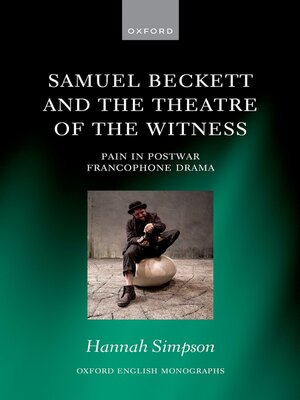Samuel Beckett and the Theatre of the Witness
ebook ∣ Pain in Post-War Francophone Drama · Oxford English Monographs
By Hannah Simpson

Sign up to save your library
With an OverDrive account, you can save your favorite libraries for at-a-glance information about availability. Find out more about OverDrive accounts.
Find this title in Libby, the library reading app by OverDrive.



Search for a digital library with this title
Title found at these libraries:
| Library Name | Distance |
|---|---|
| Loading... |
Samuel Beckett and the Theatre of the Witness explores Beckett's representation of physical pain in his theatre plays in the long aftermath of World War II, emphasising how the issues raised by this staging of pain speak directly to matters lying at the heart of his work: the affective power of the human body; the doubtful capacity of language as a means of communication; the aesthetic and ethical functioning of the theatre medium; and the vexed question of intersubjective empathy. Alongside the wartime and post-war plays of fellow Francophone writers Albert Camus, Eugène Ionesco, Pablo Picasso, and Marguerite Duras, this study resituates Beckett's early plays in a new conceptualising of le théâtre du témoin or a 'theatre of the witness'. These are plays concerned with the epistemological and ethical uncertainties of witnessing another's pain, rather than with the sufferer's own direct experience. They raise troubling questions about our capacity to comprehend and respond to another being's pain. Drawing on an interdisciplinary framework of extant criticism, recorded historical audience response, theatre and affect theory, and medical understandings of bodily pain, Hannah Simpson argues that these plays do not offer any easily negotiable encounter with physical suffering, pushing us to recognise the very 'otherness' of another being's pain, even as it invades our own affective sphere. In place of any comforting transcendence or redemption of endured pain, they offer a starkly sceptical, even pessimistic probing of what it is to witness another's suffering.







